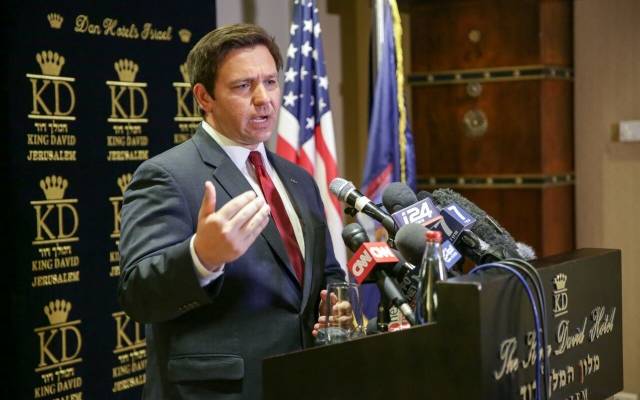“Knowing the President as a man of his word,” Congressman DeSantis thinks Trump will carry through with his pledge to move the US embassy to Israel’s capital.
President Donald Trump will fulfill his pledge to move the US embassy in Tel Aviv to Jerusalem, according to Congressman Ron DeSantis (R-FL), who arrived in Israel over the weekend with a Congressional delegation to survey several prospective sites for the embassy relocation
“Knowing the president as a man of his word, I don’t think he’s going to sign the waiver on the same month where people here in Jerusalem are celebrating the 50th anniversary of Jerusalem Day,” DeSantis said at a press conference in Jerusalem on Sunday.
DeSantis was referring to the Jerusalem Embassy Relocation Act of 1995, which granted the US president the authority to sign a six-month waiver to postpone the move indefinitely.
Congress ordered the embassy relocation more than 20 years ago, but presidents ever since have refused to comply. Several Republican senators have proposed legislation that would withhold 50 percent of the State Department’s 2017 budget until the embassy move from Tel Aviv to Jerusalem is complete.
“(Trump) is in a position where he’s either going to follow his campaign promises or he’s going to actually have to sign this waiver,” he continued, referring to the waiver’s upcoming expiration date in May.
However, DeSantis believes Trump will let the waiver expire, legally mandating the moving of the embassy to Jerusalem.
“I think (the embassy move) is going to happen and I wanted to come out here to look at some of the sites that people have discussed,” DeSantis said.
Among the several US embassy relocation sites considered by DeSantis and his delegation to be the most feasible is the US Consulate section in southeastern Jerusalem.
“My sense is that probably the (US) Consulate section is the most ready building to do an embassy,” he suggested.
Not Worried About a Violent Arab Reaction
Trump’s campaign promise to move the US embassy was met with applause in Israel, but was strongly condemned by the Palestinians, who have threatened to react with violence.
Palestinian Authority (PA) head Mahmoud Abbas warned that any attempt to move the embassy to Jerusalem would be considered more than a provocation. He hinted at a reversal of the Palestinians’ supposed recognition of Israel as a prelude to further belligerent steps.
DeSantis discounted fears regarding any potential of regional unrest.
“My sense is that when you look at some of the issues that bind our country with some of the Arab Gulf states who may not philosophically agree with this, their main concern is not Jerusalem right now,” he contended. “It’s Iran’s influence. It’s some of the other security threats they face.”
“And when you’re dealing with the Arab world, I think it’s important to project decisiveness and strength,” he added. “By Trump following through with it, I think some of these other Gulf countries and Arab countries will look at that and they’ll see a strong and decisive leader.”
Instead of expressing worry and concern about what some predict will be negative ramifications of moving the US embassy, DeSantis conveyed a sense of enthusiasm and eagerness.
“To see this happen 50 years after the liberation of Jerusalem is going to be exciting for a lot of people in the United States, and I know it’s going to be very exciting for a lot of Israelis here,” he said.
By: United with Israel Staff
